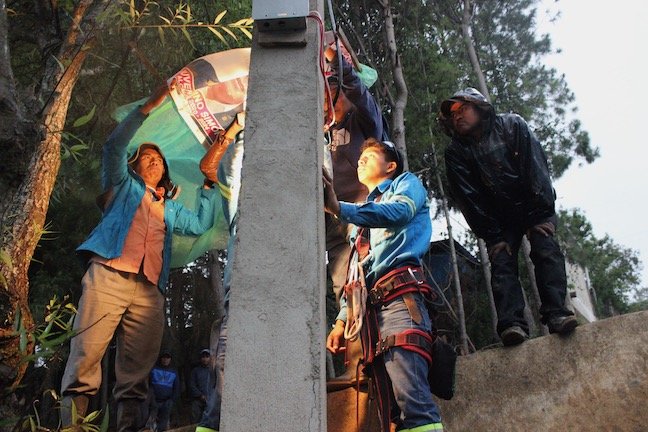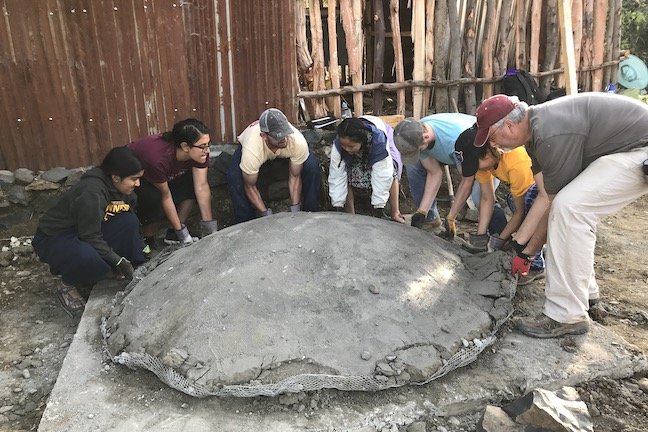Tools for success

Above: EWB members work with residents of Paraxaj to implement a water distribution system. One of EWB's biggest priorities is making sure the community members are directly involved with its projects.
Photos courtesy of EWB.
Donor support helps fund Engineers Without Borders’ global projects
November 18, 2019
Earlier this year, the University of Minnesota Twin Cities’ student chapter of Engineers Without Borders (EWB) successfully implemented a distribution system that delivered clean water to a community of 1,200 people in Paraxaj, Guatemala. But without materials from a tool drive supported by EWB donor and geoengineer Mike Heuer, this project wouldn’t have been possible.
“I was quite fascinated with what EWB was doing, what they wanted to do, and the organization as a whole,” Heuer said. “To hear them now talking about what the tools meant to them when they’re out on the project is pretty cool.”
As vice president of environmental engineering firm Braun Intertec, Heuer used his industry connections to facilitate donations of power tools like drills and saws from Twin Cities construction companies including JE Dunn, Loeffler, and Adolfson & Peterson.
Heuer’s efforts saved EWB about $5,000 in tool purchases. Plus, having both more and better equipment helped the students work more efficiently and complete the Guatemala project.
“[Having these tools] allowed us to complete the system—which most believed we would not have finished during our two weeks—a day ahead of schedule,” said Jacob Hermann, computer science major and co-leader for the Guatemala project. “None of that would have been possible without the hard work and generosity of our donors.”
Working with global communities
Donor support also enabled EWB to take two trips in 2019—one to Guatemala and the other to Filakit, Ethiopia, where students are building an irrigation system to help the community bring water to their crops during the dry season.
Both projects kicked off in May 2017, with two teams making observational trips to their respective countries. Per EWB protocol, the students visit each consecutive year and plan to stay in contact with the communities at least five years after the projects are completed.
Ensuring the sustainability of these projects is one of EWB’s priorities. The students work side-by-side with their partner communities so that they have a say in what is being constructed and know how to operate the systems post-implementation.
“The community members are the owners of every EWB project,” said Uma Venkata, a senior majoring in materials science and engineering. “The greatest NGO mistake that is committed all over the world, for decades now and for decades into the future, is that foreign groups solve problems that they choose, with solutions that make sense to them.”
Venkata served as a Spanish translator on the first two trips to Guatemala. She said her most influential experience was being able to bridge the gap between people from two different sides of the world and building a sense of camaraderie.
Hermann agrees.
“Without all of the community’s help, we could not have completed this project on our timeline,” he said.
“It’s amazing to build relationships with them," Hermann said. "I still to this day WhatsApp with several people in the community.”
And this teamwork pays off.
Initial data from the Guatemala project showed that about 85 percent of Paraxaj’s community was consuming contaminated water, and about 40 percent of them lost all access to water during the dry season. Throughout two weeks in May, EWB students worked with the community members to install 160 private tap stands in people’s homes.
Hermann said he will never forget the first time they successfully got water to flow.
“I remember sitting up on the brick wall overlooking the community,” he said. “Hearing the water come out of that tap stand was probably one of the greatest moments of my life.”
Give a little, get a little
Making a global impact by addressing water accessibility and infrastructure disparities in developing countries is undoubtedly the most important facet of EWB. However, these experiences also have an impact on those doing the work—in this case, CSE students.
Colin Bain, a mechanical engineering major and co-leader of the Ethiopia project, traveled to Filakit with EWB in May. In addition to designing an irrigation system for the community, he and the EWB team also repaired the local reservoir and built prototype solar cookers for making Injira, an Ethiopian flatbread staple.
In 2020, a team of EWB students will travel back to Ethiopia to complete these projects.

Bain said being immersed in the culture of Filakit and being able to witness this impact firsthand only expanded his passion for global outreach.
“I grew so much as a person after this trip,” he said. “After meeting so many new people and making new friends, experiencing the gift of Ethiopian hospitality on several occasions, and learning what it's like to be surrounded by a culture different from your own, I came away with an incredible appreciation for new cultures as a whole.”
Its stories like these that continue to catch the attention of EWB donors Marcus and Nicole Thompson, who fund one of the group’s travel scholarships.
“EWB is going into third-world countries that are lacking human needs, and they’re solving problems,” said Marcus Thompson, who is a civil engineer and member of the Burnsville Rotary. “Then you think about how it’s students doing this. They’re getting this great educational value being involved with a real-life project.”
“And when they come back,” added his wife, Nicole, “they’re bringing back different ideas and ways of looking at things to the engineering community here.”
But while donations like these allow the students to physically complete their projects, the benefits go much deeper than that.
“When a donation is made to Engineers Without Borders, that money is invested in the development of students as both engineers and leaders,” Bain said.
“We’re incredibly thankful for the donors who have helped make that happen by investing in our organization” he said.
For Venkata, being involved in EWB has been one of her most influential college experiences. She chose to become an engineer to build a better world for others, and ultimately EWB has provided the practice and leadership skills for her to do that.
“What is life about, if it's not for making it better for all of us?” Venkata said. “The beauty of EWB is that I can see engineering accomplish that, in real time and with students' own hands.”
Story by Olivia Hultgren
Learn more about the University of Minnesota Twin Cities chapter of Engineers Without Borders and their projects on the EWB website. To watch an extended version of the above video, watch EWB's 10-minute documentary on the Guatemala project.
If you’d like to support students in the University of Minnesota College of Science and Engineering, visit our CSE Giving website.
